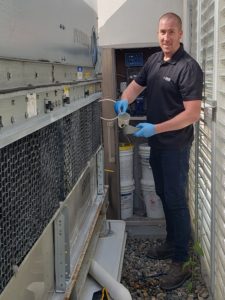Building Water Systems Certification
THE WHO, WHAT, WHY, AND HOW
By Kalpna Solanki CPHI(C) BSc MBA
Legionella was discovered after an outbreak in 1976 among people who went to a Philadelphia convention of the American Legion. Those who were affected suffered from a type of pneumonia that eventually became known as Legionnaires’ Disease.
Interestingly, Legionella was also implicated in another illness previously. The first identified cases of Pontiac fever occurred in 1968 in Pontiac, Michigan, among people who worked at and visited the city’s health department. It wasn’t until Legionella was discovered after the 1976 outbreak in Philadelphia that public health officials were able to show that the same bacterium causes both diseases. While there is no vaccine, the disease is preventable as it is almost always connected to improperly maintained mechanical systems.
Monitoring the disease trends in Canada shows there is a reason to be concerned about the incidence of Legionnaires’ Disease in Canada. Considering that these are only the reported cases, there is a very strong likelihood that individuals with milder forms of the illness may have attributed it to a cold or flu and may not have even sought treatment. There is also the strong possibility that many who did have Legionella were never tested even if they did seek medical attention.
Legionella are associated with the built environment. The bacteria can proliferate in poorly maintained plumbing and building mechanical systems and are transmitted through inhalation of contaminated water that has been aerosolised, but not by ingestion of water. Sources include, but are not limited to, cooling towers, domestic water systems, water features, ice-making machines, whirlpool spas, hot springs, and fountains, and this is where the EOCP’s new Building Water Systems (BWS) certification comes in.
This new certification came about as a result of a collaborative effort between the City of Vancouver, Vancouver Coastal Health, and the EOCP. By working effectively together, concept to launch of the certification took less than 12 months.
EOCP is only providing Certification Exams to Operators working in BC or Yukon. Pre-requisites for the Building Water System (BWS) Operator certification, and ongoing requirements to maintain the certification are:
- Completion of an accredited BWS course
- Course will be two to three days long, at least 1.2 CEUs
- Course may be in class or online
- Examination
- Web-based or paper
- $100
- 50 questions
- 1.5 hours long
- Maintaining Certification
- Payment of EOCP annual dues ($99)
- Completion of 1.2 CEUs (core and related) in every two-year reporting period (first reporting period would be 1st January 2022 to 31st December 2023)
To check on the who, what, why, and how of certification, I took the opportunity to speak with Mark Reid of Pace Solutions Corporation, the first person to gain the Building Water Systems certification.
Where do you work? I work at Pace Solutions, a Canadian water treatment service provider which has locations from BC to Ontario, but I personally provide site services in the region of Vancouver, Richmond, and the Sea-to-Sky corridor. I have been with Pace for 8.5 years.
What does your work entail? I provide water treatment programs to inhibit scale, corrosion, fouling and biological fouling(including Legionella risk management) in recirculating HVAC cooling water systems such as cooling towers, evaporative condensers, and fluid coolers. I also provide treatment programs for steam boilers, closed heating and chilled water systems.
Why did you pursue certification? When I saw that this was going to be a requirement in Vancouver as of January 1, 2022, which is the primary region where I work, it made sense to pursue this. It also provides a level of assurance for our customers that their water treatment service provider has this certification. I am being asked by customers almost daily about the EOCP certification, so it’s great to be able to share my experiences with them.
How did the process work for you? The course I took from HC Info was well laid out with good information including worksheets, and test exams. This helped me prepare for the EOCP’s certification exam. I was familiar with a majority of the study material as I have been involved in the industry for 8 years, but I still learned some really relevant content.
Would you recommend certification to others? Absolutely, 100%. Especially for anyone involved with water treatment programs in the City of Vancouver. Obtaining this certification is valuable for me, Pace Solutions, and more importantly my customers.
Would you recommend permitting of building water systems to other jurisdictions? I suspect it will eventually be implemented in other regions – this is just the beginning. It is only a matter of time before this becomes mandatory in other areas of BC.
Any recommendations for those pursuing this certification? HC Info lays out material for the 11 courses well. Anyone taking the course should print out the material for each course to assist them in preparing for the exams.
